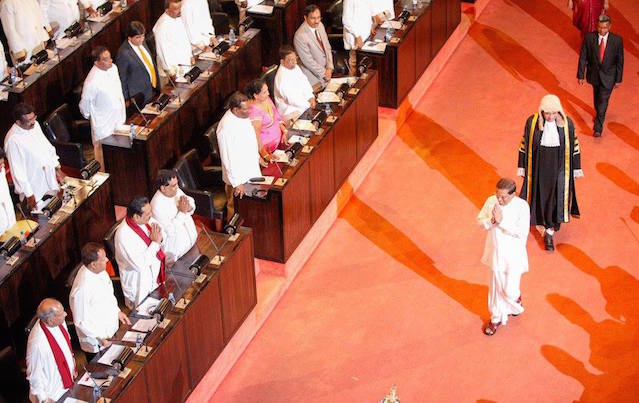Constitutional Reforms Process Needs Corrections

By Lal Wijenayake –January 15, 2018
 An important event in the Constitutional Reform Process was the discussion in the Constitutional Assembly on the first interim report submitted by the Steering Committee. The debate that commenced on the 30th of October and gone on for 5 days brought about very positive views for the success of the attempt to bring about constitutional reforms to meet the twin problems of democratization of the state and national reconciliation. In the constitutional assembly discussion on the interim report, fortunately we did not see the expected fireworks but instead what we saw was a very positive approach towards constitutional reforms. Through many divergent views were highlighted and some very critical comments made.
An important event in the Constitutional Reform Process was the discussion in the Constitutional Assembly on the first interim report submitted by the Steering Committee. The debate that commenced on the 30th of October and gone on for 5 days brought about very positive views for the success of the attempt to bring about constitutional reforms to meet the twin problems of democratization of the state and national reconciliation. In the constitutional assembly discussion on the interim report, fortunately we did not see the expected fireworks but instead what we saw was a very positive approach towards constitutional reforms. Through many divergent views were highlighted and some very critical comments made.
On a study of the constitutions made by our legislators who constituted the constitutional assembly and who are the ultimate decisions makers of this whole process, shows that the most important matter on which concerns were expressed was on the restructuring of the state/nature of the state. It was strange that though this matter has raised as an important matter of deep concern, no deep thinking/study went into this matter.
The Public Representation Committee on Constitutional Reforms (PRC) at its public sessions in all the districts made it a point to get the views of those who appeared before the PRC on this matter as we realized that this was a matter of deep concern to the people.
Regarding the democratization of the state there was all-round agreement and the only concern was on to what extent social, economic and cultural rights should be accommodated.
In the case of the restructuring of the state/nature of the state, divergent views were expressed. Most of those from the North (but not all) stood for Federalism as the solution to the national question while in the South it was the opposite, except for some academics, constitutional lawyers and politically left inclined who appeared before us or made written representations, vast majority were opposed to Federalism and the demand was for an unitary form of government. We did not take this view on its face value but probed deeply to ascertain what they meant by ‘Federalism’ and ‘unitary state’.
When we questioned those who stood for Federalism as to why they were for Federalism when under the present constitution through the 13th amendment substantial powers are devolved on the Provincial Councils. The standard answer was that the minorities were not treated equally and the minorities should have the right to decide on their …………. within the areas where they are living. When we probed deeply we saw there were reasons to show that there was discrimination on the use of their language, job opportunities and allocation of resources. When we go deeper into the problem it is seen that the Tamil community has been out of main stream politics since 1956 and they feel that they are not a part of State power and are marginalized. It is seen that the representatives of the Tamil community has not been a part of state power since 1956 though very prominent personalities with Tamil names has held positions even at Cabinet level. Therefore the main problem is the stake the community enjoys in the power structure of the state.
When we questioned those who appeared before us in the South, who were for a unitary state as to why they insist on a unitary state the standard answer was that they were against the division of the country, and the country should remain undivided under one government. They expressed the fear that federalism might lead to division of the country. When we probed as to what they feel about the Provincial Council system we found that they were for devolution of powers though they felt that the Provincial Councils has not achieved what was expected. Most important observation is that all the seven Chief Ministers who appeared before us were for devolution and implementation at the 13th amendment fully with some reservations on police and land powers that are vested in the Provincial Councils under the 13th Amendment and what they expressed was that there should be a solution regarding Police powers and land powers vested in the Provincial Council which is acceptable to all.
Even at the debate on the interim report in the Constitutional Assembly except for the JHU, there was no serious opposition to the concept of devolution of powers to the general or to the Provincial Council system.
The constitutional reforms, if it is to be meaningful, has to end in a new constitution that is acceptable to all sections of the country. It has to be a constitution that can create a Sri Lankan nation with a Sri Lankan identity, which were have failed to create during the last 70 years since independence.
We have to promulgate a constitution which will be acceptable to all sections of the people of our country, so that they will proudly say that it is their constitution and they will proudly say that they are Sri Lankans.
Therefore, we gave our mind to the possibilities of a state based on a structure acceptable to all communities. As stated in our report what will be acceptable to all sections of the people will be a state based on
